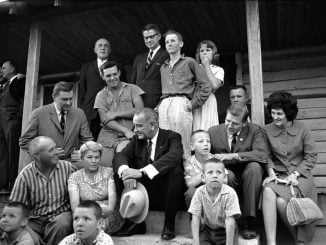
May 29
1790: Rhode Island became the 13th and final original colony to ratify the United States Constitution.
1914: The Canadian Ocean liner RMS Empress of Ireland sank in the St. Lawrence River in eastern Quebe. Ff the 1,477 people on board the Empress of Ireland, 1,012 died.
1953: Edmund Hillary of New Zealand and Tenzing Norgay of Nepal became the first climbers to reach the summit of Mount Everest.
1977: Janet Guthrie became the first woman to race in the Indianapolis 500, finishing in 29th place.
May 30
1431: Joan of Arc, condemned as a heretic, was burned at the stake in Rouen, France.
1911: The first Indianapolis 500 auto race was held at Indianapolis Motor Speedway.
1922: The Lincoln Memorial was dedicated Washington, D.C.
1935: Babe Ruth played in his last major league baseball game for the Boston Braves, leaving after the first inning of the first game of a double-header against the Philadelphia Phillies.
May 31
1790: President George Washington signed into law the first U.S. copyright act.
1921: A two-day massacre erupted in Tulsa, Oklahoma, as white mobs began looting and burning the affluent Black district of Greenwood over reports a Black man had assaulted a white woman in an elevator.
1949: Former State Department official and accused spy Alger Hiss went on trial in New York, charged with perjury.
June 1
1813: Capt. James Lawrence, mortally wounded commanding the USS Chesapeake, ordered, “Don’t give up the ship,” during a losing battle with the British HMS Shannon in the War of 1812.
1962: Former Nazi official Adolf Eichmann was executed after being found guilty of war crimes and crimes against humanity for his actions during World War II.
1980: Cable News Network, the first 24-hour television news channel, made its debut.
June 2
1924: Congress passed, and President Calvin Coolidge signed, the Indian Citizenship Act, a measure guaranteeing full American citizenship for all Native Americans born within U.S. territorial limits.
1941: Baseball’s “Iron Horse,” Lou Gehrig, died in New York at 37 from amyotrophic lateral sclerosis (ALS), also called Lou Gehrig’s disease.
1953: Queen Elizabeth II was crowned at age 27 at a ceremony in London’s Westminster Abbey.
June 3
1888: The poem Casey at the Bat by Ernest Lawrence Thayer was first published in the San Francisco Daily Examiner.
1935: The French liner SS Normandie set a record on its maiden voyage, arriving in New York after crossing the Atlantic in just four days.
1943: A clash between U.S. Navy sailors and Mexican American youth in Los Angeles sparked the Zoot Suit Riots, with white mobs injuring over 150 people citywide.
June 4
1812: The U.S. House of Representatives passed its first war declaration, approving by a vote of 79-49 a declaration of war against Britain.
1940: British Prime Minister Winston Churchill declared to the House of Commons: “We shall fight on the beaches, in the fields, streets, and hills; we shall never surrender.”
1942: The World War II naval Battle of Midway began.
1989: Thousands of pro-democracy protesters and dozens of soldiers were killed when Chinese troops crushed a seven-week protest in Beijing’s Tiananmen Square.



